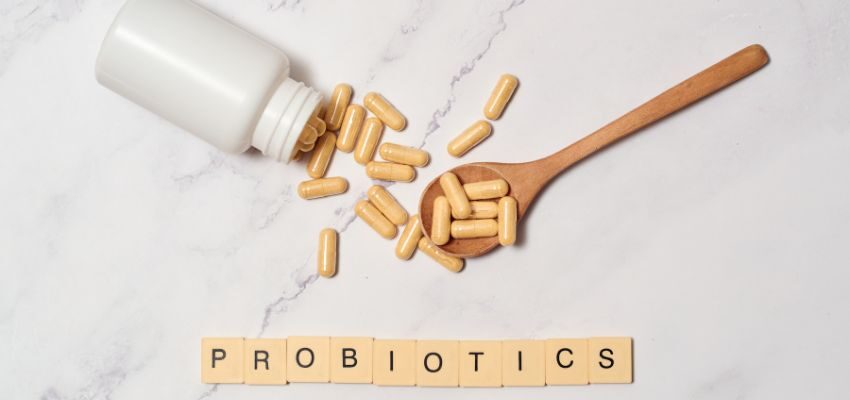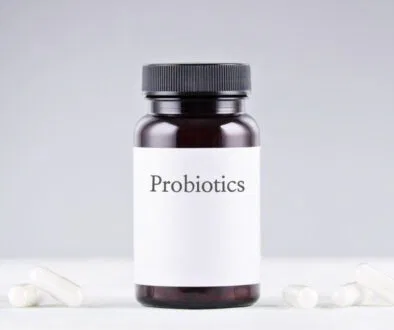How Long Do Probiotics Stay In Your System?

Published June 3, 2024
Probiotics are microorganisms that, when consumed, provide health benefits. The question is, “How long do probiotics stay in your system?” These probiotics are helpful microorganisms. They support the body’s health and proper functioning. Although bacteria are the most common probiotics, yeasts can also fulfill this function.
How Long Do Probiotics Stay In Your System?
Probiotics generally stay in your system for one to three weeks after you stop taking them. Their effects diminish over time, so regular consumption is advised to maintain benefits. The duration and effectiveness can vary based on the strain of bacteria. For instance, Lactobacillus and Bifidobacterium strains survive longer in the digestive tract than other strains.
Probiotics Vs. Prebiotics
Probiotics are live microorganisms introduced into the gut to foster a healthy balance of bacteria. However, they are foreign to the body. They can struggle to survive upon entry or be eliminated by the immune system. This limits their long-term effectiveness unless they are consumed regularly.
Prebiotics, in contrast, do not introduce new bacteria. Instead, they are complex fibers that withstand digestion and reach the gut intact. Once there, prebiotics nourish the existing good bacteria. They also strengthen the bacteria, making them better at keeping the gut healthy. Prebiotics feed helpful microbes, support a balanced microbiome, and can boost probiotics.
For the best gut health, incorporate both probiotics and prebiotics. This will help you maintain good gut health. Probiotics have good bacteria, and prebiotics ensure these bacteria are well-fed and supported, leading to a healthier digestive system.

How Long Do Probiotics Last In The Gut?
The duration probiotics stay in your gut varies based on several factors:
- Diet and Lifestyle Choices. A fiber-rich, balanced diet can help sustain probiotics longer.
- Frequency of Consumption. Regular intake is essential to maintain their presence.
- Type of Strain. Certain strains, like Lactobacillus and Bifidobacterium, may persist longer than others.
- Medications. Antibiotics and other drugs can disrupt probiotic populations.
- Dosage. Higher doses may contribute to a more prolonged presence in the gut.
Most probiotics are transient. They pass through the digestive system without staying in the gut. They perform their beneficial roles while moving through the gastrointestinal tract. This transient nature shows the importance of daily consumption. It ensures a steady supply and sustained effects.
If you stop taking probiotics, the beneficial effects will likely diminish. So, to keep supporting gut health, you should add probiotics to your daily routine.
Are There Long-Term Effects Of Taking Probiotics?
For many, the usual question is—” What happens when you take probiotics everyday?” Long-term probiotic consumption is safe and beneficial to the gut microbiome. If you’re wondering how long should you take probiotics, the period of intake varies according to the strains of bacteria and product. Regular consumption helps maintain a healthy balance of gut bacteria, improving digestion, enhancing immune function, and potentially supporting mental health.
Key points on long-term probiotic use:
- Safety and Benefits. Long-term use of probiotics is typically safe for most individuals and positively contributes to overall gut health.
- Duration of Intake. The period for taking probiotics can vary based on specific strains and products. It’s crucial to select a supplement with multiple strains and species supported by scientific and clinical evidence.
- Managing Adverse Effects. If persistent adverse effects like bloating and gas occur, consider taking a break or adjusting the strain and dosage. Not all strains suit everyone, and finding the right one may require trial and error.
- Consult a Healthcare Professional. Before starting any probiotic supplement, consult your doctor. They can suggest the appropriate strain, dose, and duration based on your health needs.
Incorporating probiotics into your daily diet can have lasting positive effects on your gut health. However, it’s crucial to pick high-quality supplements. You must monitor your body’s response and adjust with a healthcare professional.

How To Maintain A Healthy Microbiome
Probiotic supplements may lose their effect in the gut after you stop taking them. However, you can improve and maintain your gut health through lifestyle and diet.
Key strategies for a healthy microbiome:
- Prioritize a nutritious diet. Maintaining a well-balanced diet is critical for a healthy microbiome. Many microorganisms in the gut help with digestion, protect against harmful bacteria, and affect mood and mental health.
- Include fiber and prebiotic foods. Prebiotics are food components that bacteria can eat. They are non-digestible and promote the growth and activity of beneficial bacteria. Excellent prebiotic foods include:
- Onions
- Garlic
- Asparagus
- Oats
- Bananas
- Apples
- Flaxseeds
- Seaweed
- Whole grains
- Ensure regular bowel movements. Consistent bowel movements are essential for gut health. A high-fiber diet supports regularity and prevents constipation, promoting a healthy digestive tract.
- Stay hydrated. Adequate hydration is vital since fiber absorbs water. Without sufficient water intake, fiber can cause constipation. Drinking plenty of water ensures fiber works effectively.
- Adopt a diverse and balanced diet. Consume a variety of plant-based foods. They provide various nutrients and fibers, which support different good gut bacteria.
- Limit processed foods and sugars. Processed foods and high-sugar diets can disrupt the balance of gut bacteria. Minimize these in favor of whole, unprocessed foods.
- Engage in regular physical activity. Exercise positively affects gut health by promoting microbial diversity.
- Proper stress management. Chronic stress can harm the gut microbiome. Remember to practice mindfulness and meditation and get enough sleep to cut down your stress levels.
Use these strategies to create a thriving environment for your gut microbiome. This will lead to better digestion, a more robust immune system, and overall better health. Remember, a healthy gut significantly contributes to your overall well-being.
Frequently Asked Questions About Probiotics
What happens if you suddenly stop taking probiotics?
Discontinuing probiotic supplements can restore your gut bacteria balance to its pre-supplement state. Typically, this reversal occurs within a week. If you had stomach problems before taking probiotics, they might return when you stop taking the supplements.
How long do probiotics last?
When using probiotic supplements, it’s essential to be mindful of their shelf life. Remember to check the label, as most probiotics have a 2 to 4-year lifespan. Using them after their expiration date will diminish their effectiveness.
Is it acceptable to miss a day of probiotics?
Sometimes, people forget to take probiotic supplements for a day or two because they are busy or forgetful. It’s essential to use the supplement every day to get the best results. By doing so, you can enhance the benefits and support the health of your gut microbiome.
When should you take a probiotic?
For best results, take probiotics on an empty stomach. To ensure the good bacteria reach your gut fast, it’s usually best to take probiotics 30 minutes before eating. This minimizes the time it takes for them to work their magic.
Should I take probiotics every day?
If you’re wondering—should you take probiotics everyday—the answer is yes. Taking enough probiotic supplements can help maintain a healthy gut microbiome. These beneficial bacteria help to support optimal digestion, nutrient absorption, and immune function. Include probiotics in your daily routine to improve your well-being and gut health. They help create a balanced and thriving gut ecosystem.
How often should you take probiotics?
You generally take probiotics once a day, but the exact frequency can vary. It depends on the specific product and individual health needs. It’s best to follow the dosage instructions of the manufacturer or a healthcare professional.
How long should you take a probiotic?
The duration of probiotic use depends on the purpose. For general gut health, they can be taken indefinitely. For specific issues like antibiotic-associated diarrhea, a few weeks may suffice. Consult a healthcare professional for personalized guidance.
Should a woman take a probiotic daily?
Yes, many women can benefit from taking a daily probiotic. Probiotics help balance the gut microbiome. They aid digestion and boost immunity. They may also support vaginal health by preventing infections like yeast and bacterial vaginosis. As always, consult a healthcare professional to find the right probiotic strain and dosage for your needs.

The Key To Sustained Gut Health With Probiotics
Probiotics remain in your body for a while. This time depends on factors like body type, dosage, and the type of probiotics. Generally, most probiotics are cleared from the body within one to three weeks. For lasting benefits, it’s best to cycle probiotics. This lets your gut bacteria adapt and thrive.
Benefit From The Latest Advancements In Probiotic Science With Bionaze
Bionaze is a proprietary blend of probiotics proven to promote ear, nose, and throat health, improve digestion, and support your immune system. The active ingredients BLIS K12, and BL-04 are considered among the best probiotics according to science.
Get 25% Off Your First Order when you use BIO25 at checkout!

This Content Has Been Reviewed For Factual Accuracy
This content has undergone thorough fact-checking by our team of internal experts. Learn more about the meticulous editorial standard for our website here.
ADVERTISEMENT

About The Author
Hi, I’m Corinne Grace, a proud nursing graduate from Riverside College with a flair for writing. I specialize in health and wellness topics, using my educational background to weave informative and attention-grabbing articles that appeal to a wide variety of readers. Committed to excellence in writing, I’m always refining my skills to stay in sync with the fast-evolving world of digital media. Whether you’re seeking to understand complex health concepts or looking for relatable advice, I’m here to deliver content that’s accurate and enjoyable to read.




